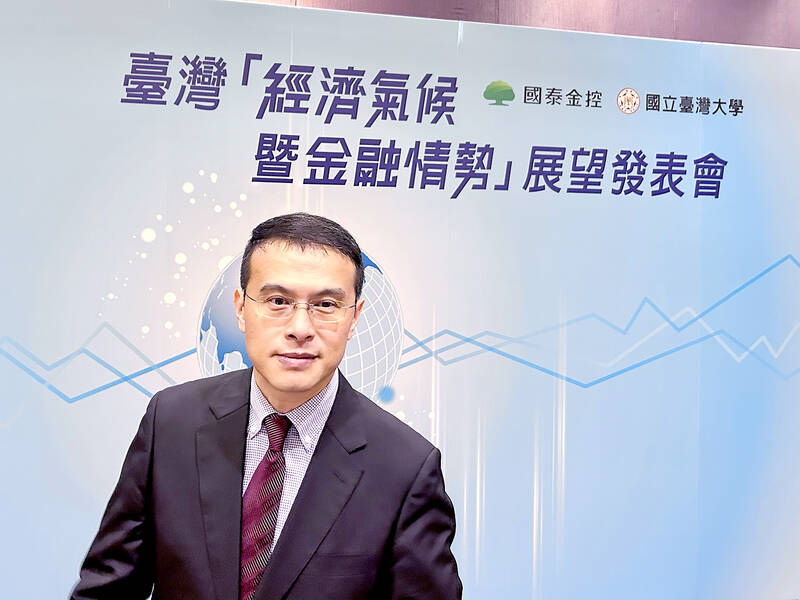Cathay Financial Holding Co (國泰金控) yesterday lowered its forecast for the nation’s GDP growth this year from 1.8 percent to 1.3 percent — its second downward revision this year — due to weak exports, slowing capital equipment imports and sagging private investment.
Despite the strength of domestic consumption, monetary tightening by central banks and economic headwinds in China have reduced demand worldwide, unfavorable to Taiwan’s export-reliant economy, National Central University economics professor Hsu Chih-chiang (徐之強) said.
Hsu heads a research team commissioned by Cathay Financial.

Photo: Wu Hsin-tien, Taipei Times
The probability of GDP growth this year falling to between 0.9 percent and 1.9 percent is about 80 percent, Hsu said, citing the research team’s estimate.
The central bank last week cut its forecast for the nation’s GDP growth this year from 1.72 percent to 1.46 percent, while the Directorate-General of Budget, Accounting and Statistics last month trimmed its forecast from 2.04 percent to 1.61 percent.
Hsu said the economy still has a chance of coming out of the woods in the fourth quarter, driven by an improvement in the manufacturing sector’s inventories, increased demand for consumer electronics during the peak season and demand for artificial intelligence-related goods.
Next year, the economy is forecast to expand by 2.9 percent, with an 80 percent probability that GDP growth would reach between 2 percent and 3.9 percent in the year, he said.
The central bank is not expected to raise its policy rates this year after pausing again at its quarterly board meeting last week, as service inflation is subsiding in Taiwan, and an end is in sight for the US Federal Reserve’s rate hike cycle, the research team said.
As Taiwan’s full-year economic growth is estimated at 1.3 percent this year and lower than that of the US and China, such situations are rare and thus a continued rate pause by the central bank is warranted, even if the consumer price index rises more than 2 percent this year, Wu said.

UNCERTAINTY: Innolux activated a stringent supply chain management mechanism, as it did during the COVID-19 pandemic, to ensure optimal inventory levels for customers Flat-panel display makers AUO Corp (友達) and Innolux Corp (群創) yesterday said that about 12 to 20 percent of their display business is at risk of potential US tariffs and that they would relocate production or shipment destinations to mitigate the levies’ effects. US tariffs would have a direct impact of US$200 million on AUO’s revenue, company chairman Paul Peng (彭雙浪) told reporters on the sidelines of the Touch Taiwan trade show in Taipei yesterday. That would make up about 12 percent of the company’s overall revenue. To cope with the tariff uncertainty, AUO plans to allocate its production to manufacturing facilities in

Taiwan will prioritize the development of silicon photonics by taking advantage of its strength in the semiconductor industry to build another shield to protect the local economy, National Development Council (NDC) Minister Paul Liu (劉鏡清) said yesterday. Speaking at a meeting of the legislature’s Economics Committee, Liu said Taiwan already has the artificial intelligence (AI) industry as a shield, after the semiconductor industry, to safeguard the country, and is looking at new unique fields to build more economic shields. While Taiwan will further strengthen its existing shields, over the longer term, the country is determined to focus on such potential segments as

COLLABORATION: Given Taiwan’s key position in global supply chains, the US firm is discussing strategies with local partners and clients to deal with global uncertainties Advanced Micro Devices Inc (AMD) yesterday said it is meeting with local ecosystem partners, including Taiwan Semiconductor Manufacturing Co (TSMC, 台積電), to discuss strategies, including long-term manufacturing, to navigate uncertainties such as US tariffs, as Taiwan occupies an important position in global supply chains. AMD chief executive officer Lisa Su (蘇姿丰) told reporters that Taiwan is an important part of the chip designer’s ecosystem and she is discussing with partners and customers in Taiwan to forge strong collaborations on different areas during this critical period. AMD has just become the first artificial-intelligence (AI) server chip customer of TSMC to utilize its advanced

While China’s leaders use their economic and political might to fight US President Donald Trump’s trade war “to the end,” its army of social media soldiers are embarking on a more humorous campaign online. Trump’s tariff blitz has seen Washington and Beijing impose eye-watering duties on imports from the other, fanning a standoff between the economic superpowers that has sparked global recession fears and sent markets into a tailspin. Trump says his policy is a response to years of being “ripped off” by other countries and aims to bring manufacturing to the US, forcing companies to employ US workers. However, China’s online warriors